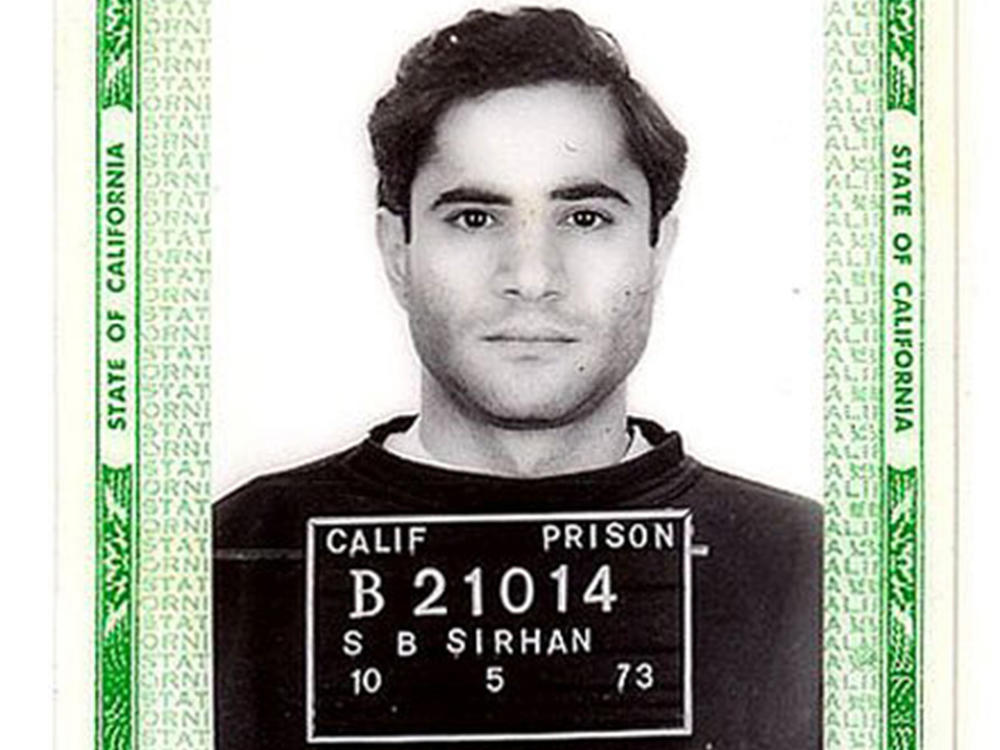Section Branding
Header Content
Sirhan Sirhan Has Served 53 Years For Killing Robert F. Kennedy. Soon He May Be Free
Primary Content
Sirhan Sirhan, the man convicted of assassinating Sen. Robert F. Kennedy during a Los Angeles presidential campaign stop in 1968, was recommended for parole Friday in San Diego.
Two commissioners of the California Board of Parole made their recommendation after a review of Sirhan's record while in prison and hearing from two of Kennedy's sons, according to The Associated Press. Here's what we know.
It could take months to have a final decision
The commissioners' decision is still subject to further review and, ultimately, final approval by the governor of California. That process could take up to 120 days.
Sirhan, 77, was convicted of the murder in 1969 and sentenced to death. In 1972 the California Supreme Court ruled capital punishment to be unconstitutional, and Sirhan was resentenced to life in prison with the possibility of parole.
The shooting occurred in the kitchen area of the Ambassador Hotel. Kennedy had just given a victory speech after winning California's Democratic presidential primary and looked likely to win the party's nomination. He and five other people were shot as they made their way through the hotel kitchen.
Sirhan was tackled to the ground, gun in hand, moments after the shooting. But there have long been some people who have advanced alternate versions of what happened that night.
Two of Kennedy's sons support Sirhan's release
One theory holds that Sirhan had been hypnotized or programmed to shoot Kennedy. Others think there were other shooters. Kennedy's son Robert F. Kennedy Jr. told The Washington Post he doesn't think Sirhan killed his father.
Paul Schrade, a labor leader who'd worked with the senator, was also shot by Sirhan that night, but he believes Sirhan should be released.
"Sirhan did not shoot Robert Kennedy," Schrade, now 96, maintains. "I got the first shot, the second shot missed Kennedy."
Schrade said unreliable ballistics evidence by the Los Angeles Police Department muddied the case, and as long as Sirhan is in prison, it will make it harder to identify the person who, in Schrade's opinion, really killed Kennedy.
"Getting him out of the picture means that we have a better chance of making the case," Schrade said. "We can get the second gunman identified and convicted — the second gunman killed Robert Kennedy!"
But the parole board ruling is not intended as an endorsement of the second gunman theory.
At the hearing, the AP reported that Douglas Kennedy spoke about being moved by the remorse shown by Sirhan over his father's killing.
"I'm overwhelmed just by being able to view Mr. Sirhan face to face," he said. "I think I've lived my life both in fear of him and his name in one way or another. And I am grateful today to see him as a human being worthy of compassion and love."
This was his 16th time trying to get parole
Sirhan tried and failed to get parole 15 times earlier, with the last hearing in 2016. But this time around, there was no opposition from the new Los Angeles district attorney, George Gascón, whose office has a policy of not weighing in against parole.
Also working in Sirhan's favor this time were changes to California law in recent years that make it easier for a prisoner to get parole for a crime committed at a young age. Sirhan was 24 when he shot Kennedy.
If Sirhan is released, he may face deportation to Jordan. A Palestinian refugee from Israel, he immigrated to the U.S. as a child and never obtained U.S. citizenship.
Copyright 2021 NPR. To see more, visit https://www.npr.org.


